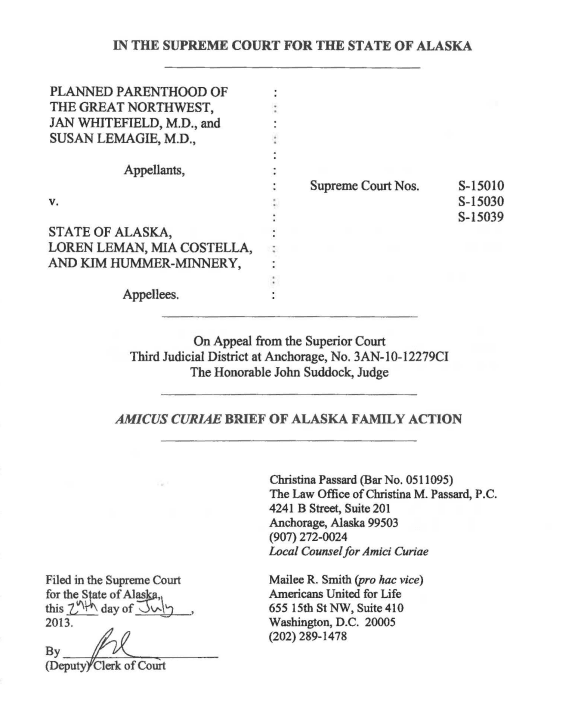
Summary of Argument
This Court has held that "the State has an undeniably compelling interest in protecting the health of minors and in fostering family involvement in a minor's decisions regarding her pregnancy." State v. Planned Parenthood of Alaska, 171 P.3d 577, 579 (Alaska 2007) (Planned Parenthood I). Yet Planned Parenthood is attempting to deny such protection to minors and their families.
As the United States Supreme Court has acknowledged, the "abortion decision has implications far broader than those associated with most other kinds of medical treatment." Bellotti v. Baird, 443 U.S. 622, 649 (1979). The Court has stated that "immature minors often lack the ability to make fully informed choices that take account of both immediate and long-range consequences." As recently as 2007, the Court held that "[s]evere depression and loss of esteem can follow" the abortion decision. Gonzales v. Carhart, 550 U.S. 124, 159 (2007).
In fact, in H.L. v. Matheson, the Court stated that the emotional and psychological effects of abortion are markedly more severe for girls under the age of 18—those women the State of Alaska is seeking to protect under its Parental Notice Law (PNL). 450 U.S. 398, 411 n.20 (1981). And in Roper v. Simmons, the Court took note of the unique vulnerability of minors when it enunciated the following three differences between minors and adults:
Minors possess a lack of maturity and an underdeveloped sense of responsibility, which result in impetuous and ill-considered actions and decisions;
Minors are more vulnerable or susceptible to negative influences and outside pressures, including peer pressure; and
The character of a minor is not as well formed as that of an adult, with the personality traits of minors being more transitory and less fixed.
543 U.S. 551, 569-70 (2005).
The State has advanced several compelling interests—affirmed by this Court as well as the U.S. Supreme Court's decisions—which support the PNL. These compelling interests are reinforced by studies revealing that parental involvement laws (requiring either parental consent or parental notification) decrease both minor abortion rates and minor birth rates—meaning that such laws succeed in protecting minors not only from the risks inherent in abortion, but from any risks related to childbirth. See Part I, infra. Further, studies demonstrate that minors are particularly impacted by the physical and psychological risks of abortion, making it even more necessary for a parent to be involved in the minor's abortion decision and recovery. See Part I, infra. Moreover, because of their inexperience and the sexual culture surrounding them, minors are inherently vulnerable to coercion in their sexual interactions, and parental involvement laws help protect minors from sexual exploitation. See Part III, supra.
This data overwhelmingly supports the State's compelling interests in protecting the health and welfare of minors and affirming a parent's fundamental right to direct the upbringing of his or her daughter.